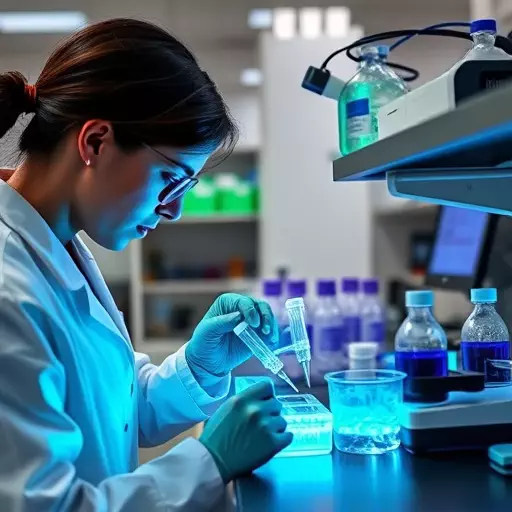The evolution of portable mass spectrometry and microfluidic technologies has dramatically transformed field labs, particularly in Lansing-East Lansing, by enabling on-site analysis, quick decision-making, and unprecedented cellular study through single-cell sequencing. These innovations streamline workflows, reduce errors, and unlock applications like real-time environmental monitoring and rapid healthcare diagnoses. In cancer research, this technology revolutionizes single-cell sequencing by facilitating high-throughput analysis, offering profound insights into tumor heterogeneity, and enabling personalized treatment approaches. Innovations in microfluidics further enhance lab diagnostics, making advanced techniques more accessible and efficient, especially in resource-limited settings.
In today’s fast-paced world, efficient and portable lab equipment is crucial for field research, especially in the realms of environmental monitoring and healthcare. This article explores the groundbreaking advances in portable mass spectrometry, single-cell sequencing, and microfluidics, and how these innovations are transforming lab work in East Lansing. By delving into these technologies, we uncover their transformative potential, from revolutionizing cancer research through enhanced cellular analysis to enabling rapid, accurate diagnostics using microfluidic devices.
- The Evolution of Portable Mass Spectrometry: Revolutionizing Field Labs
- – Exploring the need for advanced portable technology in field labs
- – Current state and limitations of traditional mass spectrometry in lab settings
- Single-Cell Sequencing on the Go: Unlocking New Possibilities in Cancer Research
The Evolution of Portable Mass Spectrometry: Revolutionizing Field Labs

The evolution of portable mass spectrometry technology has brought about a transformative change in field labs, particularly in regions like Lansing-East Lansing, where efficient and accessible lab work is essential. These innovative devices are revolutionizing diagnostic capabilities by enabling on-site analysis, eliminating the need for samples to travel long distances to centralized labs. This advancement is pivotal for research labs, especially those focused on cancer research, as it facilitates quicker decision-making and treatment planning through real-time data acquisition.
Single-cell sequencing techniques, once confined to high-end facilities, are now being integrated into field labs thanks to portable mass spectrometry innovations. This enables researchers in Lansing-East Lansing’s cancer research labs to study cellular variations at an unprecedented level of detail, leading to more precise diagnoses and tailored treatment strategies. Furthermore, microfluidic innovations play a significant role in enhancing lab-based diagnostics, allowing for miniaturized and integrated analysis systems that improve efficiency and reduce the potential for errors during sample handling.
– Exploring the need for advanced portable technology in field labs

In today’s fast-paced scientific landscape, especially in field labs conducting lab work in lansing-east lansing, the need for advanced portable technology is more crucial than ever. Traditional lab setups often require significant resources, time, and expertise to operate effectively, making it impractical for on-site analysis in remote or dynamic environments. Portable mass spectrometry systems are emerging as game-changers, enabling scientists to conduct sophisticated analyses anywhere, anytime. This shift towards portability not only streamlines workflows but also opens doors to innovative applications, such as real-time environmental monitoring and rapid diagnosis in healthcare settings.
The integration of microfluidics and single-cell sequencing technologies further enhances the capabilities of these portable devices. Innovations in microfluidics for lab-based diagnostics allow for miniaturized sample processing and detection, making it possible to conduct complex analyses on a tiny scale. In cancer research labs, for instance, this technology is revolutionizing the role of single-cell sequencing by enabling high-throughput analysis of individual cells, providing unprecedented insights into tumor heterogeneity and potential therapeutic targets. Such advancements are not only transforming field research but also setting new standards for accuracy, efficiency, and accessibility in laboratory settings across various disciplines.
– Current state and limitations of traditional mass spectrometry in lab settings

In traditional lab settings, mass spectrometry (MS) has been a cornerstone for identifying and quantifying chemical compounds across various fields, including cancer research in East Lansing labs. However, despite its power, MS faces limitations that hinder its application in certain scenarios. One significant challenge is the time-consuming nature of sample preparation, which often requires intricate procedures to ensure accurate results. This process can be particularly cumbersome for field labs where quick and efficient analysis is crucial, especially in dynamic environments like East Lansing’s research landscape.
Moreover, traditional MS techniques are typically designed for high-throughput operations within controlled lab environments, making them less adaptable for on-site applications. The role of single-cell sequencing in cancer research has further emphasized the need for advanced diagnostic tools. Innovations in microfluidics offer a promising solution by enabling compact and integrated systems for lab-based diagnostics. These developments aim to streamline sample manipulation, reduce analysis time, and enhance the sensitivity of MS, potentially transforming field labs in East Lansing and beyond.
Single-Cell Sequencing on the Go: Unlocking New Possibilities in Cancer Research

In recent years, advances in portable mass spectrometry and microfluidics technologies have revolutionized lab work in the field, including cancer research labs in East Lansing. One notable application is Single-Cell Sequencing (SCS) on the go, enabling researchers to analyze individual cells directly from patients’ samples without the need for traditional lab settings. This innovation is a game-changer in cancer research, as it allows for more precise diagnosis and personalized treatment approaches. By unlocking the potential of SCS outside controlled lab environments, researchers in East Lansing can now explore cellular heterogeneity in real-time, leading to breakthroughs in understanding complex cancer subtypes.
The role of single-cell sequencing in cancer research labs has been transformative, providing a deeper look into the biological mechanisms driving tumor growth and progression. Innovations in microfluidics for lab-based diagnostics have made these advanced techniques more accessible and portable. This advancement facilitates faster sample processing, reduced costs, and increased efficiency, especially when conducting field research or working in resource-limited settings. As a result, researchers can now make on-the-spot decisions, adapt to dynamic environments, and ultimately improve patient outcomes.
